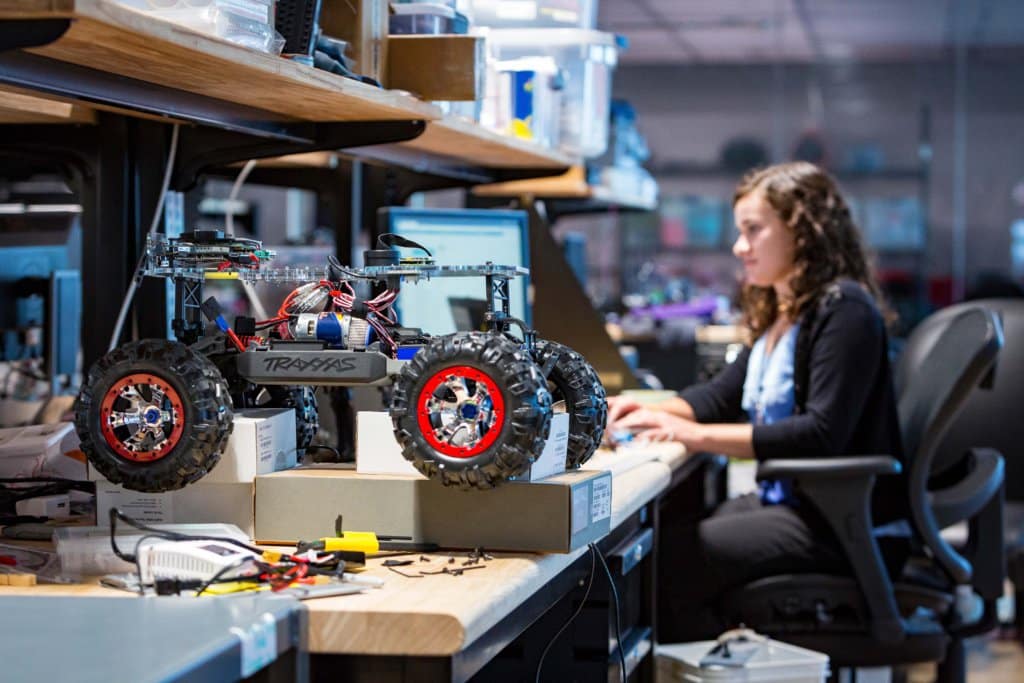
To thrive in an age of disruption and to contribute to a world grappling with a climate crisis and the Fourth Industrial Evolution, start with a STEM degree. That’s Science, Technology, Engineering and Mathematics — the disciplines providing the knowledge and skills crucial to addressing many of the world’s most urgent problems, from global warming to mass urban migration and social unrest.
Yet, despite its importance, the STEM fields fields remain heavily male-dominated. Only about one in five engineering degrees go to women. None of the 2021 science Nobel laureates are women. Women comprise only 24% of physics PhD graduates in Germany. Whether at work or on campuses, women continue to be severely underrepresented.
The good news is there are universities that take gender equality seriously. They are raising awareness of the importance of empowering women to pursue careers in STEM and introducing clubs and organisations for women in STEM. Begin your inclusive STEM programme with these top-tier universities:
University of California, Irvine

The University of California, Irvine Henry Samueli School of Engineering hopes to bridge the gap between male and female engineers. Source: University of California, Irvine
Home to five Nobel laureates, the University of California, Irvine ranked 38th on a list of best engineering schools. With over 12 undergraduate and 13 graduate programmes, it is no question that the University of California, Irvine is the ideal choice for a career in engineering.
UC Irvine has an integrative approach that combines fundamentals, research and hands-on experience to provide opportunities to develop future innovative and creative engineers.
The department offers six academic departments related to the field of engineering. This includes biomedical engineering, chemical and bimolecular engineering, civil and environmental engineering, electrical engineering and computer science, materials science and engineering, and mechanical & aerospace engineering.
To bridge the gap between male and female students pursuing a career in a STEM-related field, the University of California, Irvine engineering programme formed an organisation called the Society of Women Engineers.
The society acts as a driving force to empower women who are interested in a career in engineering. Recognising their contributions and reminding them they can establish a successful career as an engineer.
Dalhousie University

Dalhousie University encourages young women to follow their passion in STEM-related fields. Source: Dalhousie University
Located in Halifax, one of Canada’s most exciting and vibrant technology and innovation hubs, Dalhousie University is home to a Computer Science faculty of many firsts. It is one of the few standalone Computer Science faculties in Canada and the largest Computer Science research and education centre in Atlantic Canada, among other accolades.
It is a 2020 affiliate of a world-leading diversity and inclusion initiative too — a continuation of its commitment to a more inclusive student body in computer science. Other initiatives towards gender parity include the WeAreAllCS initiative with Women in Technology Scholarships that are open to international female-identifying students.
This commitment not only makes programmes like the Bachelor of Computer Science, Bachelor of Applied Computer Science, Master of Applied Computer Science, and Master of Digital Innovation richer. It opens up invaluable opportunities for students from underrepresented groups to gain work experience through co-op placements with companies like IBM, Twitter, and the Ocean Tracking Network as well. As they apply classroom theory, explore career options, and strengthen their CVs, they are realising the potential of Computer Science to serve as a catalyst for positive change.
Such features help international students like Manar Elgamil from Egypt build a bright future in Halifax. “I’ve grown to love the city and the people here, while completing my university degree,” she says. “And Dalhousie being the highest ranked university in Atlantic Canada will surely help me land a full-time position as a software engineer in Halifax, as it helped me already with finding a good co-op position.”
Tufts University

Tufts University has been working towards gender parity in STEM for many years. Source: Tufts University
Every year, the Tufts University School of Engineering makes great strides progressing toward its goal of gender parity.
At Tufts, Dean of Graduate Education Karen Panetta leads all graduate programmes for the School of Engineering and teaches electrical and computer engineering. On the national level, she contributes to systemic change through positions with IEEE, the world’s largest technical professional organisation dedicated to advancing technology for the benefit of humanity, and through the nationally-acclaimed program Nerd Girls, which she founded to promote engineering disciplines to young students.
Dean Panetta exemplifies the support that awaits Tufts School of Engineering students and the success that graduates find. Here, students can achieve their professional goals, advancing their careers in industry or preparing for further research and graduate study — 98% of Tufts School of Engineering graduates had secured employment or received a job offer at the time of graduation. With a Tufts education, they engineer their future.
Engineering is for anyone with a passion for problem-solving. Tufts School of Engineering welcomes students to join its MS programmes in Bioengineering, Biomedical Engineering, Chemical Engineering, Civil and Environmental Engineering, Computer Engineering, Computer Science, Cybersecurity and Public Policy, Data Science, Electrical Engineering, Engineering Management, Human Factors Engineering, Human-Robot Interaction, Innovation and Management, Materials Science and Engineering, Mechanical Engineering, Offshore Wind Energy Engineering, and Software Systems Development.
Whichever programme they choose, students will receive top-notch classroom instruction with hands-on experience and interdisciplinary projects in small classes, as well as close mentoring and support from world-class faculty. Learn more here.
Johns Hopkins University Whiting School of Engineering

Johns Hopkins Society of Women Engineers aims to empower women to pursue careers in STEM. Source: Johns Hopkins University
Having been around since 1913, Johns Hopkins University (JHU) Whiting School of Engineering has been providing an unrivalled engineering education for over a century. JHU has been recognised as one of the nation’s top universities for engineering and ranked 13th in the U.S. News & World Report Best Colleges. JHU School of Engineering is the first university in the nation to integrate research into its curriculum. They have now established more than 20 research centres and institutions.
JHU’s curriculum is designed to ensure that students are able to thrive in their field of study. Flexibility, hands-on learning and mentorship are some of the elements that are emphasised in their curriculum.
Only 30% of women currently make up JHU Whiting School of Engineering. However, the Johns Hopkins Society of Women Engineers was formed to promote the endeavours of females that are in STEM-related fields. Collaborating with undergraduate and graduate students, professors, alumni, and industry professionals, they work together to host events and engage in outreach ventures to highlight the importance of female engineers. As part of their outreach efforts, they mentor young girls from Baltimore elementary and middle school to encourage them to pursue a career in the STEM field.
*Some of the institutions featured in this article are commercial partners of Study International







